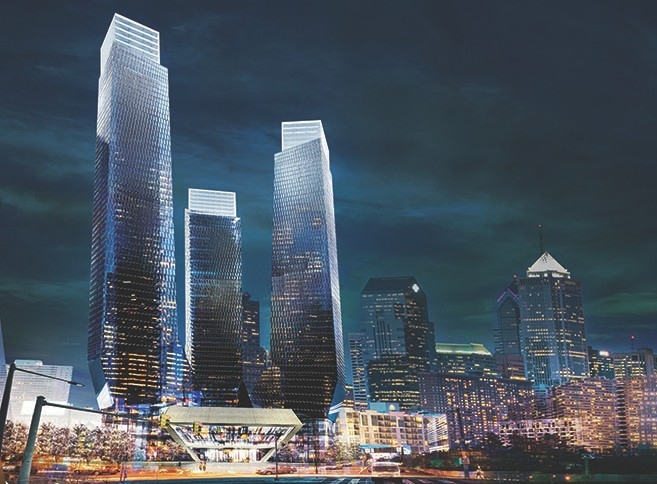
Institute for Smart & Healthy Cities
Transforming Urban Environments
Jefferson’s Institute for Smart and Healthy Cities was created to support the research, innovation and education that is happening across the university focusing on transforming urban environments into smart and healthy cities. The institute is conceived as an aggregator and facilitator of transdisciplinary research and education across multiple disciplines driving the future of our cities and communities. Supported by data and smart technologies, Smart Cities is an emerging paradigm in the development of urban environments in an attempt to build more efficient, healthier and livable cities.
We’re changing the way we live, work, travel and learn for a healthier future.
- Understanding the entire city as a system and solving tomorrow’s most pressing problems: urbanization, public health, energy and transportation
- Making a direct impact at the community and city scale by researching the intersection of environmental conditions, housing, workplace, transit, public infrastructure and health
- Finding opportunities to further link the institute to our increasingly connected clinical systems
- Partnering with technology incubators to provide students access and support through the co-invention process
The Institute for Smart and Healthy Cities is a collaborative effort between the College of Architecture and the Built Environment, College of Population Health, and the Kanbar College of Design, Engineering and Commerce.
Cities Under Climate Threat: Venice – Philadelphia
In a joint effort, students from Thomas Jefferson University and Università Iuav di Venezia had an opportunity to showcase their projects at the Palazzo Badoer in Venice during the Venice Biennale 2023.
The exhibit was also featured at Design Philadelphia - one of the oldest design festivals in the country. For nearly a decade, Jefferson has been an active participant because we value engagement and understand the transformative power of design
DesignPhiladelphia Celebrates City’s Creativity & Innovation
Project Highlights Rome 2050
The Smart and Healthy Cities Studio shows the complex interconnection between climate change and the macro, mezzo, and micro–contextual relationships between factors that have often not been considered. The studio offers solutions for how cities can be better prepared for future global crises and how to transform cities under climate threats into more resilient towns to support a fair city to live, work, and do business.
Grants & Proposals
Grants & Proposals
Funding Landscape
Thomas Jefferson University (Jefferson) has sought Hanover’s assistance in identifying funding opportunities to support its Institute for Smart & Healthy Cities (JISHC). Building on the emerging concept of “Smart Cities,” in which urban environments harness data and technology to improve living conditions, JISHC will serve as a collaborative and transdisciplinary hub for research, education, innovation, and programmatic efforts that will contribute to building healthier and more livable cities
ERASMUS+KA171
Thomas Jefferson University in partnership with Università Iuav di Venezia, Italy, has been the recipient of an Erasmus+ for Higher Education grant funded by the European Union Program (ERASMUS+ KA 171). The grant supports student mobility for training and education, as well as staff mobility for training and teaching between the Institute for Smart and Healthy Cities at Thomas Jefferson University and Università Iuav di Venezia.
Rolling Applications for 2024/25 Academic Year
- All activities must be completed by July 31, 2025
Student Research & Travel Award
The Institute for Smart and Healthy Cities is pleased to announce the Smart & Healthy Cities Student Research and Travel Award. These grants provide funding to support graduate student research with a focus on the quality of life in urban settings.
News & Events
Research Areas
Research Areas
Urban Scale
- Characterize the interrelationship of urbanization, transportation and energy on population health.
- Analyze human behavior changes and the drivers for change though data-driven analysis, modeling, and simulation and visualization.
- Evaluate the research outcomes in statistical models to plan and predict future changes in the domains health, energy and transportation.
Building Scale
- Predict the effects of daylighting and natural ventilation on health outcomes in work, life and healing spaces.
- Develop new concepts for sustainability and net zero energy buildings and predict health benefits.
- Understand human behavior in relationship to building systems, space and environment.
Device Scale
- Characterize the connectivities and interfaces between the built environment and humans.
- Develop human centric building controls and management technology.
- Understand the interconnectivity between health data and environmental data, micro climate and air pollution.
News & Student Research Projects
Podcast Institute for Smart & Healthy Cities Connects Three Colleges in Cross Disciplinary Effort
Jefferson's College of Architecture & The Built Environment, the Kanbar College of Design, Engineering & Commerce and the College of Population Health come together to develop cities in the face of climate change, social inequity, rapid urbanization and health disparities.


